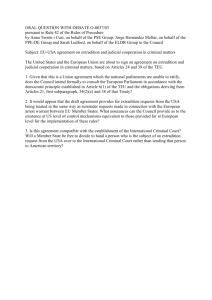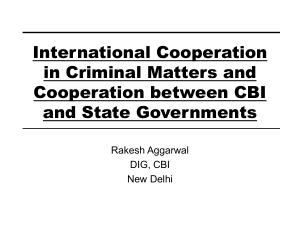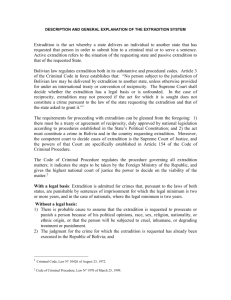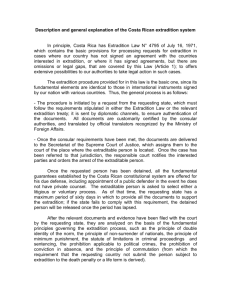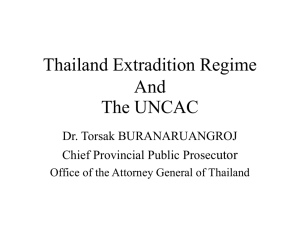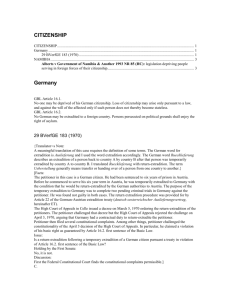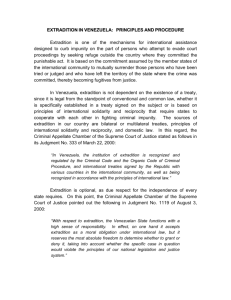Minister of Justice v Burns and Rafay
advertisement
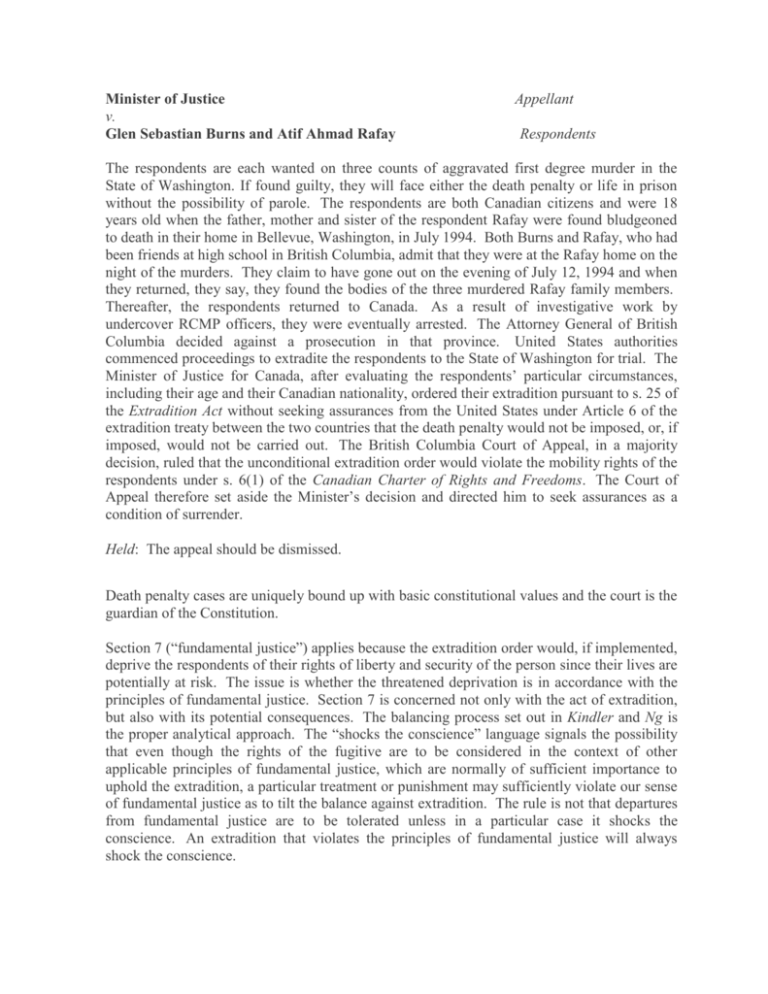
Minister of Justice v. Glen Sebastian Burns and Atif Ahmad Rafay Appellant Respondents The respondents are each wanted on three counts of aggravated first degree murder in the State of Washington. If found guilty, they will face either the death penalty or life in prison without the possibility of parole. The respondents are both Canadian citizens and were 18 years old when the father, mother and sister of the respondent Rafay were found bludgeoned to death in their home in Bellevue, Washington, in July 1994. Both Burns and Rafay, who had been friends at high school in British Columbia, admit that they were at the Rafay home on the night of the murders. They claim to have gone out on the evening of July 12, 1994 and when they returned, they say, they found the bodies of the three murdered Rafay family members. Thereafter, the respondents returned to Canada. As a result of investigative work by undercover RCMP officers, they were eventually arrested. The Attorney General of British Columbia decided against a prosecution in that province. United States authorities commenced proceedings to extradite the respondents to the State of Washington for trial. The Minister of Justice for Canada, after evaluating the respondents’ particular circumstances, including their age and their Canadian nationality, ordered their extradition pursuant to s. 25 of the Extradition Act without seeking assurances from the United States under Article 6 of the extradition treaty between the two countries that the death penalty would not be imposed, or, if imposed, would not be carried out. The British Columbia Court of Appeal, in a majority decision, ruled that the unconditional extradition order would violate the mobility rights of the respondents under s. 6(1) of the Canadian Charter of Rights and Freedoms. The Court of Appeal therefore set aside the Minister’s decision and directed him to seek assurances as a condition of surrender. Held: The appeal should be dismissed. Death penalty cases are uniquely bound up with basic constitutional values and the court is the guardian of the Constitution. Section 7 (“fundamental justice”) applies because the extradition order would, if implemented, deprive the respondents of their rights of liberty and security of the person since their lives are potentially at risk. The issue is whether the threatened deprivation is in accordance with the principles of fundamental justice. Section 7 is concerned not only with the act of extradition, but also with its potential consequences. The balancing process set out in Kindler and Ng is the proper analytical approach. The “shocks the conscience” language signals the possibility that even though the rights of the fugitive are to be considered in the context of other applicable principles of fundamental justice, which are normally of sufficient importance to uphold the extradition, a particular treatment or punishment may sufficiently violate our sense of fundamental justice as to tilt the balance against extradition. The rule is not that departures from fundamental justice are to be tolerated unless in a particular case it shocks the conscience. An extradition that violates the principles of fundamental justice will always shock the conscience. The important inquiry is to determine what constitutes the applicable principles of fundamental justice in the extradition context. The outcome of the appeal turns on an appreciation of these principles, which in turn are derived from the basic tenets of our legal system. While these basic tenets have not changed since 1991 when Kindler and Ng were decided, their application 10 years later must take note of factual developments in Canada and in relevant foreign jurisdictions. 1. In this case, it is said that a number of factors favour extradition without assurances: (1) individuals accused of a crime should be brought to trial to determine the truth of the charges, the concern being that if assurances are sought and refused, the Canadian government could face the possibility that the respondents might avoid a trial altogether; (2) justice is best served by a trial in the jurisdiction where the crime was allegedly committed and the harmful impact felt; (3) individuals who choose to leave Canada leave behind Canadian law and procedures and must generally accept the local law, procedure and punishments which the foreign state applies to its own residents; and (4) extradition is based on the principles of comity and fairness to other cooperating states in rendering mutual assistance in bringing fugitives to justice, subject to the principle that the fugitive must be able to receive a fair trial in the requesting state. Countervailing factors favour extradition only with assurances. First, in Canada, the death penalty has been rejected as an acceptable element of criminal justice. Capital punishment engages the underlying values of the prohibition against cruel and unusual punishment. It is final and irreversible. Its imposition has been described as arbitrary and its deterrent value has been doubted. Second, at the international level, the abolition of the death penalty has emerged as a major Canadian initiative and reflects a concern increasingly shared by most of the world’s democracies. Canada’s support of international initiatives opposing extradition without assurances, combined with its international advocacy of the abolition of the death penalty itself, leads to the conclusion that in the Canadian view of fundamental justice, capital punishment is unjust and should be stopped. While the evidence does not establish an international law norm against the death penalty, or against extradition to face the death penalty, it does show significant movement towards acceptance internationally of a principle of fundamental justice Canada has already adopted internally -- namely, the abolition of capital punishment. International experience thus confirms the validity of concerns expressed in the Canadian Parliament about capital punishment. It also shows that a rule requiring that assurances be obtained prior to extradition in death penalty cases not only accords with Canada’s principled advocacy on the international level, but also is consistent with the practice of other countries with which Canada generally invites comparison, apart from the retentionist jurisdictions in the United States. The accelerating concern about potential wrongful convictions is a factor of increased weight since Kindler and Ng were decided. The avoidance of conviction and punishment of the innocent has long been in the forefront of “the basic tenets of our legal system”. The recent and continuing disclosures of wrongful convictions for murder in Canada and the United States provide tragic testimony to the fallibility of the legal system, despite its elaborate safeguards for the protection of the innocent. This history weighs powerfully in the balance against extradition without assurances when fugitives are sought to be tried for murder by a retentionist state, however similar in other respects to our own legal system.
